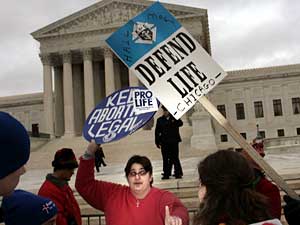|
Audio
Photos
More from MPR
Resources
|
Sioux Falls, S.D. — South Dakota lawmakers are expected to consider several bills on the subject of sex and abortion during the current legislative session. One says no one can hand out contraceptives in a public school. Another would require that abstinence be taught in sex education classes.
But the bill getting most of the attention would make a doctor who performs an abortion a felon.
Currently only one clinic and one hospital in the state perform abortions; both are in Sioux Falls. Doctors are routinely flown in from Minnesota to perform the procedures -- about 15 abortions every week.
The proposal would make it a crime to perform an abortion except to save the life of the mother.
Rep. Roger Hunt, R-Brandon, is the primary sponsor of the abortion ban. He doesn't hide the fact that he wants this to be the test case that could reverse Roe vs. Wade. Hunt believes life begins at conception, and therefore abortion is murder. He says times have changed.
"Over 30 years of technology, scientific information, medical studies tell us about fetal pain, tell us about unborn children having surgery performed on them," says Hunt. "We know more about post-abortion problems, both physical and mental. We know more about life."
Hunt says there's no longer the stigma attached to being a single mother. He also claims the relationship between a woman and her doctor has changed, and women are no longer getting the information they need to make an informed decision.
Sen. Jay Duenwald, R-Hoven, supports tighter restrictions on abortions, but he doesn't plan to support a ban.
"It would probably not pass muster with the Supreme Court as it's written, as I understand it," says Duenwald. "Now understand that I have not read the bill, so I'm not positive of that. It's just what I've gathered from conversations with other people that it will fail in any court."
Duenwald didn't support an attempt by lawmakers two years ago to ban abortion either. At that time, Gov. Mike Rounds issued a technical veto, saying there had to be an exception to save the life of the mother included in the ban before he could support it. The bill lost by one vote.
Sponsors of the new bill say all the technical problems are fixed. Gov. Rounds hasn't said if he'll sign the bill.
Bob Burns, a political science professor at South Dakota State University, says anti-abortion groups are well organized in South Dakota, and many national groups pressure lawmakers on the issue.
Burns says South Dakotans should ask why the Legislature would deliberately and consciously approve a statute they know is in conflict with current constitutional law.
"We wonder if the Legislature would approve a law that violates freedom of speech protected by the First and 14th Amendments, simply to create a test case. It seems to be a peculiar approach to lawmaking," says Burns.
Last summer, a task force studied abortion laws in the state and whether more restrictions were needed. Supporters of legal abortion say the task force was stacked with extreme views of people opposed to legal abortion, and the group only heard testimony it wanted to hear.
Thelma Underberg, executive director of NARAL Pro-Choice South Dakota, says she's not surprised by the legislation introduced this week -- but she's disappointed.
"There's not much interest in what happens after birth, or what kind of situation the mother is in, or what kind of situation she's might be bringing children into the world," says Underberg.
Some say there are more pressing issues in the state besides banning abortion. Lawmakers will meet in session at the Capitol in Pierre for only 35 days. But lawmakers who oppose legal abortion say they have made their positions known to constituents, and they are the ones who are elected.
Polls taken during the 2002 and 2004 U.S. Senate campaigns showed 60 percent of those polled opposed banning abortions. But polls also showed 60 percent of South Dakotans identified themselves as pro-life.
During the session, lawmakers will also decide whether to put a constitutional amendment on the ballot, which would define that life begins at conception and prevent any public money from paying for abortions. It would give voters their chance to say what they really believe.





